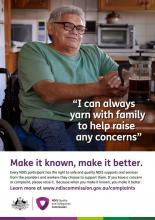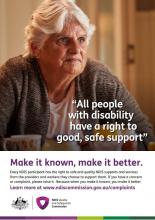As an NDIS participant you have the right to be safe and to receive quality services from the providers and workers you choose. You or people in your support networks can raise a concern or complaint if you are not happy with the quality or safety of your NDIS supports or services.
Raising an issue, concern or complaint is important. NDIS providers need to:
- make sure you feel safe to raise your concerns with them
- manage your complaint quickly and effectively
- assist you to contact the NDIS Commission to make a complaint.
Your complaint can help other people with disability. A complaint helps NDIS providers and workers understand what’s important to you and other people with disability. This knowledge can help improve the quality of their supports and services.
I'm so grateful to have Grace.
They're my support worker.
My last support worker didn't respect or understand me.
They were judgemental, never used my pronouns, and always seemed uncomfortable.
A friend told me to contact the NDIS Quality and Safeguards Commission to help me talk to my NDIS provider about finding the right support worker.
Grace values all of me.
They see me as a person first and understand what is important to me and my identity as a trans person with disability.
People might not think it's a big deal, but it's huge.
I tell all my friends with disability that it's their right to feel respected and supported.
They need to make it known, so it becomes the norm.
If anybody feels they cannot speak to their NDIS provider, they can contact the NDIS Quality and Safeguards Commission.
Because if you make it known...you make it better.
Quality NDIS supports and services
There are expectations and standards that NDIS providers and workers need to meet when they provide you with supports and services. When you understand these standards, you can recognise when you need to raise your concern with the provider or NDIS Quality and Safeguards Commission.
Video: Understanding the NDIS Code of Conduct (Auslan)

Acting with respect for individual rights
Jono has the right to communicate thoughts and feelings by using a tablet. When a support worker wouldn’t communicate using the tablet, Jono didn’t feel respected or listened to. This concern was raised with the NDIS provider.
- Video: Acting with respect for individual rights
- Video: Acting with respect for individual rights (Auslan)
- Poster: It’s important I’m treated with respect
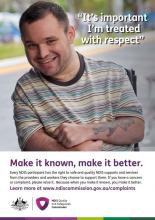
Acting with respect for individual rights – LGBTQIA+ communities
A transgender NDIS participant found their support worker was judgemental, seemed uncomfortable and never used their pronouns. They worked with the NDIS Commission and their NDIS provider to find the right support worker who made them feel respected and supported.
- Video: Acting with respect for individual rights – LGBTQIA+ communities: Akii and Rora
- Video: Acting with respect for individual rights – LGBTQIA+ communities: Akii and Rora (Auslan)
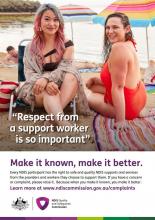
Grant has a support worker Mik who supports Grant as a whole person, not just a person with disability. They know it’s fundamental for queer people to feel respected and supported and encourage anyone who doesn’t feel this way to raise it with their provider or the NDIS Commission.
- Video: Acting with respect for individual rights – LGBTQIA+ communities: Grant
- Video: Acting with respect for individual rights – LGBTQIA+ communities: Grant (Auslan)
- Poster: It’s important I’m supported as a whole person

Respecting privacy
When an NDIS provider brought a student in training into Lexie’s home without prior warning, Lexie felt disrespected and like privacy had been compromised. Lexie raised this with the NDIS Commission.
- Video: Respecting privacy
- Video: Respecting privacy (Auslan)
- Poster: When my privacy was breached, I said something
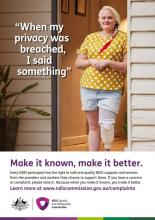
Being safe and competent when providing support
Liddy found that a support worker didn’t know how to operate a hoist and it made her swing around and feel unsafe. She contacted the NDIS provider and they arranged training for the support worker.
- Video: Providing supports and services in a safe and competent manner
- Video: Providing supports and services in a safe and competent manner (Auslan)
- Poster: I had to say something or nothing would change
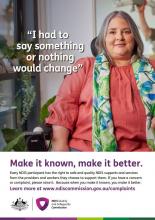
Acting with integrity, honesty and transparency
A support worker used their own supermarket rewards card to collect points when shopping with a participant. They were asked not to do that, but they did it again. The NDIS Commission and NDIS provider worked together to resolve the issue.
- Video: Acting with integrity, honesty and transparency
- Video: Acting with integrity, honesty and transparency (Auslan)
- Poster: If I hadn’t said something, nothing would have changed

Providing supports with quality and safety
Francessca felt uncomfortable when a support worker drove fast and got angry in traffic. Francessca spoke to a family member and was encouraged to contact the NDIS provider. Francessca has a new driver and now feels safe.
- Video: Taking steps to raise and act on concerns around quality and safety supports
- Video: Taking steps to raise and act on concerns around quality and safety supports (Auslan)
- Poster: I didn’t feel safe, I knew things needed to change
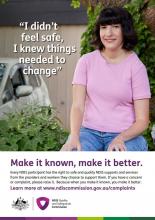
Preventing all forms of violence, exploitation, neglect and abuse
Vicky needs help with balance, getting around and mealtime. One day Vicky was having trouble swallowing but the support worker was distracted on their phone and didn’t notice. Vicky’s family knew the outcome could have been much worse and were upset and concerned. They contacted the NDIS provider who contacted the NDIS Commission.
- Video: Taking steps to prevent and respond to all forms of violence, exploitation, neglect and abuse
- Video: Taking steps to prevent and respond to all forms of violence, exploitation, neglect and abuse (Auslan)
- Poster: Vicky’s family want her to feel supported and safe

Making a complaint - First Nations peoples
First Nations people with disability and their family or support workers talk about their support and raising concerns or complaints.
- Video: Making a complaint: Destiny and Rita
- Video: Making a complaint: Destiny and Rita (Auslan)
- Poster: It’s OK to complain or raise concerns

Language translations
The videos above are available in the following languages:
- العربية / Arabic
- Sūrāyē / Assyrian
- 简体中文 / Chinese – Simplified
- 繁體中文 / Chinese – Traditional
- دری / Dari
- Tagalog / Filipino
- Français / French
- Ελληνικά / Greek
- हिंदी / Hindi
- Italiano / Italian
- ចក្រភពខ្មែរ / Khmer
- 한국어 / Korean
- македонски / Macedonian
- Samoa / Samoan
- Español / Spanish
- Türkçe/Turkish
- Tiếng Việt / Vietnamese
